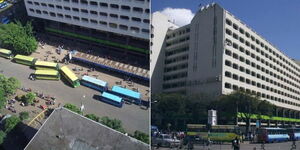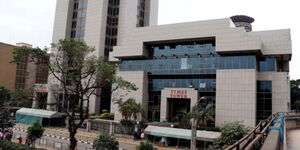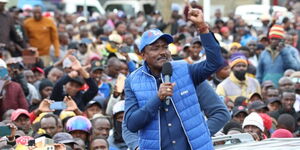Traders from the sprawling Kongowea market stood their ground against police personnel and forced their way into the market on Monday, April 6.
The traders who compromised both wholesalers and retailers were acting contrary to a directive issued by the Mombasa Governor Hassan Joho on March 20 ordering the market closed for a 30-day period.
In a video by the Daily Nation published on Monday, March 6, the frustrated traders are seen wielding tree branches while blocking the Buxton Junction in Mombasa County.
Watch the video below:
{"preview_thumbnail":"/files/styles/video_embed_wysiwyg_preview/public/video_thumbnails/LAGorlSISGA.jpg?itok=b5N-0TWq","video_url":"https://youtu.be/LAGorlSISGA","settings":{"responsive":1,"width":"854","height":"480","autoplay":0},"settings_summary":["Embedded Video (Responsive)."]}
Amidst sounds of gunshots and 'Haki Yetu' chants, the incensed traders face off with the police in an effort to make their complaints heard.
The more daring group of the traders surround one of the police vans and refuse to allow its movement past the erected human barricade.
The traders succeeded in their efforts and managed to direct food trucks bearing vegetables, sukumawiki and potatoes from the Buxton Junction towards the Nyali Bridge despite police efforts to stop them.
One of the traders who spoke to the daily proclaimed that the county government's move to close the markets was denying them their daily source of income and placing their families at the mercy of hunger.
The protest involved more than 100 traders who asserted that their established clientele was based at the Kongowea market.
Ibrahim Basafar, the Mombasa County Deputy Director of Traffic, maintained that the traders' actions endangered lives in light of the country's efforts to contain the spread of Covid-19.
“We need personal responsibility at this point in time. I am aware there was a commotion at Buxton and we cleared the traffic for ease of movement but it is unfortunate that they still want to go and crowd at the market. The law will deal with them,” stated Basafar.
According to 2018 figures from the Kenya Burea of statistics, the informal sector in Kenya accounted for 83% of total employment.
The fresh vegetable trade in Kenya counts as part of the informal sector and remains largely unregulated.
Experts warned that this part of the informal economy would be largely affected by the coronavirus pandemic including reduced demand for the goods they offer resulting in lower revenues.
Additionally, these workers would be largely unable to observe social distancing measures, particularly in market spaces which are characterised by overcrowding.












